Mind Streaming
John Coxon's Online Journal|
Archive Search |
| Links |
|
and s-integrator |
Friday, July 25, 2003
IN THE FARMER'S ARMS

The Anatomy of a Typical English Pub
Sociological background
Trying to find a English pub with characteristics that you could define as 'typical' is as difficult as looking for a typical church. Like churches, there are thousands of pubs throughout the country, each occupying a building in a range of locations, and in a wide variety of archtitectural styles, construction materials, sizes and ages and catering for different client groups with a variety of needs. Older pubs are rarely exactly as they have always been and the buildings are inevitably modified to meet the ever-changing demands of the market.
An estimated twenty pubs close down permanently each year across the country as life styles change and large profit-led companies, who these days manage them, ruthlessly axe pub businesses that do not make them sufficient profit. Pubs have always had an important social function in community life.
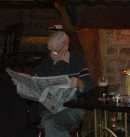
This gentleman, seated near the 'inglenook' fireplace, is probably what we call a 'regular' ( someone with a regular time pattern of frequenting the pub) He's obviously enjoying a quiet pint and read of the afternoon newspaper and very probably sees this as his regular spot to sit and it is certain that this is his 'local'. Many people still have what we call their 'local', that is one preferred pub near their home that they regularly visit. But because of major changes in life styles, traditional local pubs cannot guarantee their continued existence if they simply cater for people's need to have somewhere to sit and have a quiet drink with their friends.
There has been fairly recently , an explosive growth nationally in the number of shops and supermarket chains selling, competitively, the full range of alcoholic drinks for home consumption, and pubs have had to change their business philosophy to tempt customers from their homes and away from these cheaper sources of alcohol for home use. (My home is in a predominently working class area of the city, and the high concentration of premises here selling alcohol may not be typical, but, equally, I am sure that, nationally, the rather worrying trend is for there to have been a significant increase in the general consumption of wines, beers and spirits)
Within easy walking distance of my home, there are twelve pubs and an astonishing eight retailers who sell cheap alcoholic drinks. I live one hundred yards away from four pubs and two booze-only shops and three convenience stores that also sell booze during pub hours.) There has been, as well, a change in youth culture comparatively recently where young men and women, often in rowdy groups, spend their evenings and weekends binge drinking, often moving through a range of night clubs and pubs that cater for this more fickle end of the drinks market. Within my town, many of the drinking pubs have developed regular activities throughout the week with for example, quiz nights, live music and Karaoke competitions and some have security staff at the door.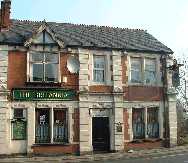
This local pub, the Britannia, a hundred yards from my house is not somewhere I would personally go for a drink in the evening. It is pretty rough and ready in comparision to the Farmer's Arms, and has loud live music, karaoke or disco music every night. The prospect of being able to make or actually hear a conversation here is remote. ( Within fifty feet of this pub are two booze shops as well) The 'Brit' is essentially heaving with rowdy local "youngsters" every night and not , as they say, my scene at all.
Quieter, more family orientated, pubs here are often the ones that have added a restaurant section to keep up the number of customers throughout the week. Some of the big breweries have created large restaurant sections in all their pubs, and their menus are common to all them all. Its usually good value but rather bland unremarkable fayre. The Farmer's Arm restaurant is family run, still good value, but provides varied menus of excellent food. It offers too, the added bonus that the eating areas are small and homely in scale and that adds to the intimacy and enjoyment of eating here. 
THE FARMER'S ARMS- MY IDEA OF A GREAT 'TYPICAL' PUB
For me, the concept of the typical English pub has to be personal and subjective, and, the wonderful Farmer's Arms , on Manchester Road in Swinton has many of the features that I'd expect to find in a traditional, 'typical' pub. Firstly, and most important to me, the pub is genuine. It is not from the 'dream book' drawing board of some slave architect briefed by a brewery to create a traditonal pub from scratch. Nor is it stuffed with reproduction ephemera to artificially create a traditional, 'olde worlde' ambience. The pub occupies premises built in 1820 ; orginally the local "Smithy." (Blacksmith's) In 1830, the blacksmith, Edward Pearson, became the first beer retailer in Swinton (on his Smithy premises.) What is now called Manchester Road was then called Dark Lane in the mid 1800's and the area was known as Orrell Gate (Toll Gate) from the days prior to metaled roads, when stretches of more primitive road surfaces were built and maintained by small companies who made travellers pay a fee or toll for dubious honour of using their stretch of roadway.
According to the current landlord tennant, who has been the licensee for some twenty years, the Farmer's Arms is a Grade Two listed building (We have a national system of listed buildings , that is for classifying , registering and thus protecting buildings of historical and architectural importance.) The building is ostensibly owned by the celebrated local Brewery, Boddington's, whose 'Manchester' beers are made at the Strangeways site right next door to Salford's Strangeways Prison. (In fact, it is only through the good will of the actual owners of Boddington's, the giant Scanadnavian conglomerate Interbrew, that the brand is still produced in the traditonal way, locally, and marketed under its own name.) 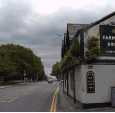
The Farmer's Arms, up to nineteen years ago, had a front entrance which opened directly, with no pavement, onto the busy Manchester Road and the landlord tells me that he fiercely tried to resist the Magistrate's demands that the entrance be blocked off for safety reasons since, throughout its history, nobody, remarkably, had ever been injured by traffic when leaving the pub through this exit. 
The lovely pub sign above this blocked entrance has always been flat to the wall and never hanging high up , in the more traditional way, at right angles to the building so it could be easily seen by passers by. Over the years, the pub interior has retained its low ceiling, original low wooden beams, narrow corridors and small rooms, and in fact the building has led the charmed life it deserves. There have been, over the years, road improvement schemes proposed and attempts to modify the building, and even relocate it. The building has remained virtually intact with the support of local Magistrates who have respected and bowed to public pressure to retain the buildings orignal historical integrity. In 1999, a sensitive, well designed extension was built onto the rear of the building to house a restaurant and kitchen, thus ensuring the continued success of the business and the preservation of this historic building.
'Pub' is short for 'public house' and you are in no doubt that, to the publican, (landlord) this is his home that is open to the public. (He told me that he has a list of some three hundred people who are permanently banned from entering his pub because, under his rules of reasonable conduct, those people had transgressed and are quite rightly no longer welcome. The brewery owners, he told me, want him to renounce the current legally binding (on both parties) agreement in favour of a new one that he does not have to accept legally, and will not.

Thus, while he maintains, meticulously, the glorious interior, with its wonderful collections of authentic old pictures and artefacts and original furnishings, the brewery, rather churlishly, in my view, will no longer take their responsibility for maintaining the fabric of the exterior of the building, much to the chagrin of the landlord.
The end of the school term, Tuesday July 22nd, involved a number of my school colleagues adjourning to the Farmer's Arms for a celebratory drink and great restaurant meal and that happilly gave me the opportunity to take a number of photographs inside this lovely pub to illustrate this article, (having been willingly given permission by the friendly landlord who is justly proud of his home/pub.)
Traditional Pub Tables and Seating
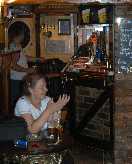
In a crowded pub, (and the Farmer's Arms is very popular and gets pretty crowded, I hear, most evenings) space is at a premium and what tables there are have to be heavy and solid lest drinks be spilled accidentally, by people brushing past. Hence the range of dark, rich mahogany topped rectangular and circlular tables in the Farmer's Arms have traditional cast iron bases.
Traditional round topped tables , like this wonderful sculpted example, featuring what I think is our traditional national emblem, Britannia, can accommodate a number of low, richly upholstered stools. Here is another lovely variant with cast iron base.

The rectangular tables, like this one,
often have uphostered wooden chairs, but of course, stools can be pulled up so that more people can congregate at the table as well. 
This type of table base is quite common in old pubs and represents the widespread practice of making use of something obselete, in this case, the heavy base of an old "Singer" treadle sewing machine. The circular feature is the original pulley wheel and incidentally, the treadle on this one still goes up and down ! Here is another example of the heavy cast iron support for one of the rectangualr tables in the pub

For me, essential seating in a real pub has to be the comfortably and richly upholstered custom-built continuous 'benching' that hugs the inside walls of the room in a pub like this one.

Where I come from,in the South of England, these are known locally as settles.( although that word often refers to wooden seating traditionally placed at right angles, either side of an open fireplace.) As a general rule, the settles in public bars tend to be upholstered in ox-blood or dark green coloured heavy buttom-backed vinyl and settles in the more plush lounge rooms are upholstered with often tapestry-patterned heavy duty draylon or velour.
The Bar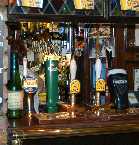
Traditionally, pub bars are made from good quality mahogany with a deep dark polish capable of resisting surface damage from dripped or spilt drinks. There may be movable plastic 'sop' trays ( grated to catch the drips) where pints of beer are can be rested after they have been poured or pulled from the pumps before the customer takes their drink to their table and also small beer towels and beer mats are there to protect the bar. In a traditional pub, there should actually be a 'bar'(rail). Here there is a heavy brass rail in front of and level with the bar surface, on the customer side. and, just above floor level, a second continuous heavy brass bar for resting one of your feet on if you are drinking at the bar, or to increase your stature when vertically challenged ! (little) when trying to get the attention of the bar staff at busy times. (Word has it that the upper brass bar is to enable people to steady themselves as the night progresses and the room starts to sway.)
The Farmer's Arms is what we call 'tied house', that is, the licencee can only sell the products endorsed by the owning brewery, in this case Interbrew. Boddington's is simply one of their brand names, and here at the bar are two traditional hand pumps, one for bitter and the other for mild. Beer is organic, has a limited shelf life and has to be carefully 'conditioned' and looked after and that requires hard work in the cellars , and skill and judgement to keep the beer at its best. Most pubs these days receive beer in pressurised aluminium kegs called 'firkins.'( the old name for the measure of a fourth of a barrel) and containing 9 imperial gallons as opposed to the much larger 'hogshead' which contains 56 gallons and only used, I believe, in the Manchester area these days, by just one traditional, family run independent local brewery, Joseph Holts. Hand pumps are the exception these days rather than the rule and the majority of pubs use a tap system with beer piped by compressed air from the kegs in the cellar to the bar taps. (Some pubs have fake pump handles concealing the pressure taps)
In conclusion, the Farmer's Arms is my idea of a great traditional unspoilt English pub ; it has all the essential features I cherish and would always hope to find. In many ways, the atmosphere and quality of a pub is dependent on the kind of person who runs it. The landlord of the Farmer's Arms has fiercly protected the authenticity of his pub and ensures that the interior is maintained to the highest standards. The least plush of the bars to the rear of the pub is decorated with what I am sure is the landlord's personal collection of Manchester United Football Club memorabillia. He is clearly as passionate about the country's most successful football team as he is about his pub, and evidently intends to keep it in the premier league of the hospitality industry. Even the toilets are imaculate, and in fact have lovely mahogany doors with original leaded windows.

johncoxon 4:28 AM - [Link] - Comments ()
...